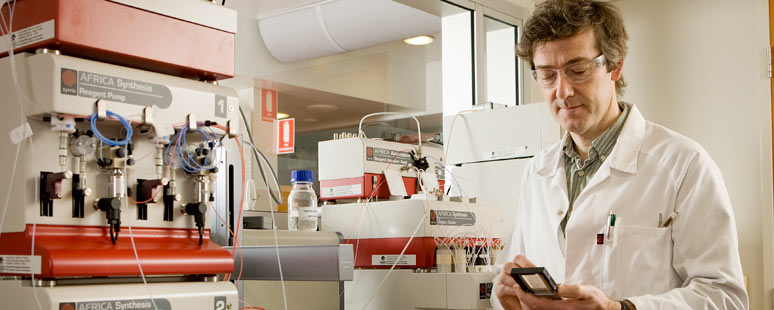Researcher Highlights
Driving the Therapeutic Drug Revolution
Professor Adam McCluskey
Professor Adam McCluskey has been a driving force behind the establishment of the Centre for Kinomics, a world-first research facility.

McCluskey has established the Centre in collaboration with respected neurobiologist Professor Phil Robinson, of the Children's Medical Research Institute (CMRI) at Westmead.
The Centre is named for a biological process called phosphorylation that is mediated by kinases, hence 'kinomics', and which controls the activation of many signalling and enzymatic proteins.
The Centre, which has laboratories at the University of Newcastle and CMRI, has been funded by a $1 million prize from the Ramaciotti Foundation and a $3.1 million grant from the Australian Cancer Research Foundation for the study of protein kinases and the drugs that target them.
The Centre's focus is designing next generation drugs for epilepsy, cancer and neuropathic pain. So far the focus has been epilepsy, a disorder where one in three sufferers gain no relief from existing treatments. The goal is creating drugs that do not have the often debilitating side effects.
The emerging field revolves around the 518 protein kinases in the body, which are the key signalling proteins behind biological functions. If they malfunction then the body malfunctions.
Pharmaceutical companies invest billions of dollars in research to develop kinase inhibitors.
"It's a crude analogy," says McCluskey, "but in drug design there is the lock and the key. You either want to lock or unlock the protein action and the drug is the key that will enable you to do that."
Using unique equipment costing hundreds of thousands of dollars, the researchers are able to quickly pinpoint the undesirable elements of existing therapeutic drugs.
"We can identify the range of proteins a drug interacts with and look out for red flags," explains McCluskey, a chemist. "There are some proteins you would never want a drug to touch because of the serious, even deadly, side effects."
The Centre is extending a 2007 discovery by a private German drug company that involves a new technique for analysing interactions between kinase inhibitors and hundreds of proteins at a time. The technology is known as Kinobeads and it fast tracks what has been until now a time-consuming process.
Mass spectrometry determines what proteins have been singled out by the Kinobeads, indicating which kinases have remained bound to the drug in question. The process would normally take at least six months but the Centre's cutting-edge technology will reduce it to a few days.
There are 23 research groups around the world waiting for the Centre to produce its first batch of beads. This technology gives us the ability to rapidly enhance our potential to test and manufacture pharmaceuticals that will benefit many individuals suffering from a range of disorders.
Professor McCluskey's research is conducted in collaboration with the Hunter Medical Research Institute's (HMRI) Cancer Research Program. His research is supported by grants from HMRI.
Find out more
The University of Newcastle acknowledges the traditional custodians of the lands within our footprint areas: Awabakal, Darkinjung, Biripai, Worimi, Wonnarua, and Eora Nations. We also pay respect to the wisdom of our Elders past and present.
